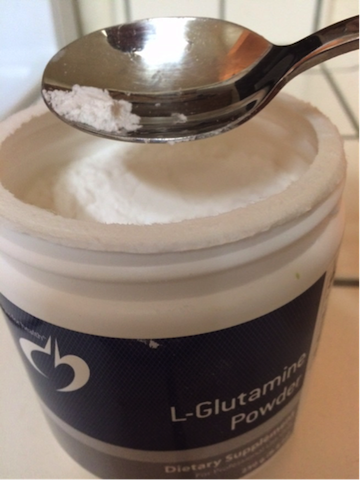
If you’ve been following me for awhile, worked with me, read my book The Antianxiety Food Solution, or listened in on The Anxiety Summit, you’ll be aware that I use glutamine with clients to help with blood sugar control while we’re figuring out diet/breakfast/adrenal health and the carbohydrate/sugar cravings associated with low blood sugar. Opened on to the tongue or taken in powder form glutamine is super-effective for stopping that intense desire for something sweet if it’s related to low blood sugar.
Integrative psychiatrist Dr. Hyla Cass and Julia Ross, MA both recommend glutamine for addiction and carb cravings, as well as for blood sugar control. During a past Anxiety Summit, Dr. Cass shared how to break free of addictions. And Julia Ross, a pioneer in the use of individual amino acids talked about glutamine and other amino acids for eliminating anxiety.
My clients also find benefits as far as healing the leaky gut and glutamine is recommended by many respected integrative practitioners for this purpose: Dr. Josh Axe, Dr. Amy Myers, author of The Autoimmune Solution , and Dr. David Perlmutter, author Grain Brain during his interview with Dr Tom O’ Bryan on The Gluten Summit. Steven Wright also writes about leaky gut and glutamine on the SCD lifestyle blog, as does fermentationist Summer Bock.
With all these benefits, my clients love this amino acid!
Here is very encouraging feedback from one of the participants in the Amazing Aminos for Anxiety group program:
I started the glutamine trial low and slow. I have been taking 500mg three times a day AM AFT & BED for the past 4 days. I am celiac and have irritable bowel as well. The 2-3x a day diarrhea I have been experiencing has completely stopped! Blood sugar feels stable – not hungry and not craving. Psychologically, I’m feeling more resilient i.e., calmer and more positive on a daily basis. I am surprised that glutamine has helped so much
My gut is healing and my mental health has improved markedly through this trial.
She confirmed that adding the glutamine was the only change she made. She is already gluten-free and her diet doesn’t include any grains, legumes or lactose etc. She also avoids other foods to which she has had reactions.
I was so thrilled with these fabulous results and this was my feedback:
These are fabulous results – so happy for you! If you feel you could get added benefits i.e. if these symptoms (low blood sugar, hunger, craving, resilience) are not all 0s (with 10 being the worst on a scale of 1 to 10) then I’d consider bumping up the glutamine to 1000mg 3 x day to see if you get added benefits. If you don’t see added benefits then you can go back down.
It’s very common to get good results like this so I’d like to share another example. I met Nicole at the NTA conference and she shared how she suffers from low blood sugar issues:
I get irritable, I get shaky and I get to the point that if I don’t get food NOW I think I’m going to hurt something!
She did a trial of 500mg glutamine and in under 5 minutes she went from that frantic feeling to a very calm feeling:
I’m ok. I feel happy, I feel calm, I feel I can make it longer without needing food right away. I’m impressed at how well that worked for me.
You can read more about low blood sugar and watch Nicole’s video feedback here.
Of course there is research supporting the many benefits that glutamine has for gut health. Here are some excerpts from the abstract of a 2015 paper titled: Glutamine and intestinal barrier function.
glutamine has been reported to enhance intestinal and whole-body growth, to promote enterocyte proliferation and survival, and to regulate intestinal barrier function in injury, infection, weaning stress, and other catabolic conditions
glutamine stimulates growth of the small intestinal mucosa in young animals and also enhances ion transport by the gut in neonates and adults
as a functional amino acid with multiple key physiological roles, glutamine holds great promise in protecting the gut from atrophy and injury under various stress conditions in mammals and other animals.
And this 2015 paper titled: Oral supplementation with L-glutamine alters gut microbiota of obese and overweight adults found that adults supplemented with 30g of glutamine a day for just 14 days had a change in gut bacteria:
Oral supplementation with [glutamine], for a short time, altered the composition of the gut microbiota in overweight and obese humans reducing the Firmicutes to Bacteroidetes ratio, which resembled weight loss programs already seen in the literature.
In a randomized, double-blind, placebo-controlled trial that was conducted in children aged two months to nine years from the urban shanty compound community of Fortaleza, Brazil, it was found that:
Glutamine and all combined nutrients (glutamine, vitamin A, and zinc) improved the intestinal barrier function in these children
When it comes to cravings, addiction and appetite we have this research supporting the use of glutamine:
- Glutamine and glutamatergic metabolism is a factor in cravings and alcohol dependence
- A combination of tyrosine, lecithin, glutamine and 5-HTP helped withdrawal syndromes and mental symptoms in detoxified heroin addicts
- Glutamine has been shown to decrease secretion of ghrelin, the hormone that impacts appetite regulation. High levels of ghrelin appear to make high-calorie foods look more appealing.
I do want to end by saying there are some possible concerns with cancer supplementation and be sure to check with your oncologist if you are currently undergoing treatment. I write about these concerns here – Glutamine supplementation: cancer concerns and benefits.
Have you successfully used glutamine for helping with low blood sugar control, reducing carb or other cravings/addictions, and healing your leaky gut?

